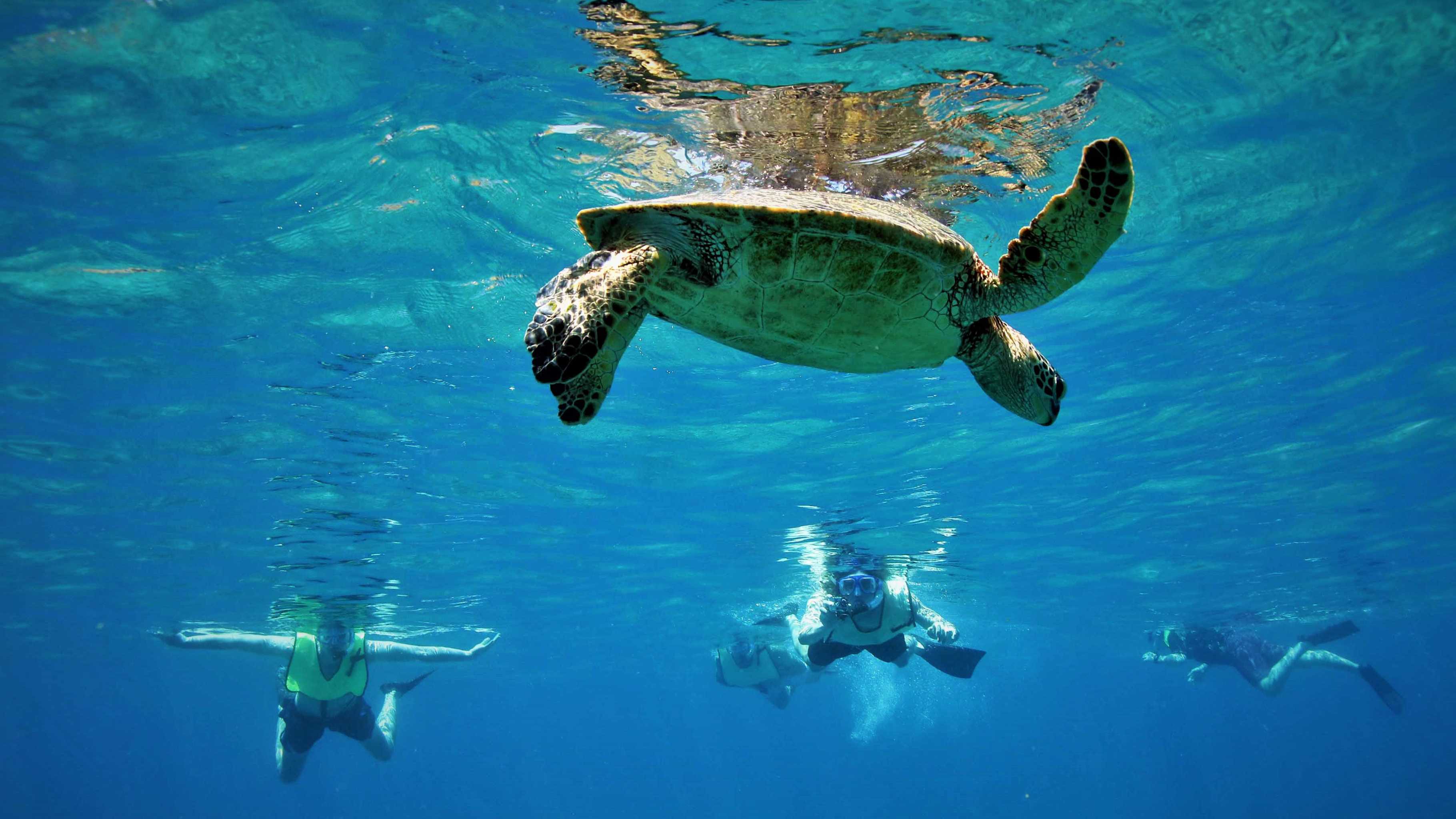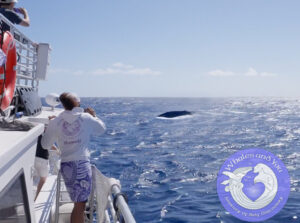10 Weirdest Sea Creatures in Hawaii
1) Humuhumunukunukuāpuaʻa (Reef Triggerfish)
Hawaii’s state fish sports a kaleidoscope of patterns and a name that’s longer than the fish itself. At night it can “lock” its dorsal spine to wedge into rocks for safety, and during the day it hovers and darts like a tiny helicopter with precise fin flicks.
Hawaii local tip: Ever wondered how to pronounce humuhumunukunukuāpuaʻa? It’s a tongue-twister even for visitors! Want to know the correct way? Check out this Instagram video on pronunciation.
Where to spot: Shallow reefs around Oahu, especially calm, clear areas off Waikiki’s south shore.

2) Leaf Scorpionfish
Perfectly disguised as a drifting leaf, this ambush hunter gently sways with the current until prey passes by. Its spines are venomous (painful, not usually dangerous)—a classic “look, don’t touch” reminder.
Where to spot: Rock and coral edges with mild surge; a guide’s sharp eyes help a lot.

3) Flying Gurnard
Part fish, part airshow. This bottom-dweller “walks” on the sand and suddenly unfurls giant pectoral fins—electric-blue panels that look like UFO wings—to startle predators.
Where to spot: Sandy flats and rubble zones; sometimes near deeper channels off Oahu’s south and west coasts.

4) Frogfish
The reef’s master of disguise. Frogfish can change color, “walk” on fin-feet, and even dangle a fleshy lure to trick dinner within striking range. Its lightning-fast gulp creates a vacuum that swallows prey whole.
Where to spot: Sponges, algae-covered rocks, and coral heads—often hiding in plain sight.

5) Sea Cucumber
Looks like a soggy sea sausage, but sea cucumbers are the reef’s sanitation crew, recycling sand and nutrients. Some species eject sticky threads—or even organs—to distract attackers. Nature is wild.
Where to spot: Sandy patches between coral heads; move slowly and you’ll see them everywhere.

6) Boxfish (including the Yellow Boxfish)
Imagine a swimming cube with polka dots. Boxfish hover more than swim, steering with tiny fin flicks. Juveniles (bright yellow with black spots) are the cutest anomalies you’ll meet underwater.
Where to spot: Calm reefs with crevices; juveniles sometimes near sheltered lagoon areas.

7) Trumpetfish
Long and flute-like, trumpetfish stalk prey by turning vertical and blending into sea fans or pretending to be a waving stick. They’ll even shadow larger fish to sneak closer to a meal.
Where to spot: Reef slopes and drop-offs; look for motionless “sticks” pointing downward.

8) Parrotfish
With beak-like mouths, parrotfish scrape algae off coral and—believe it—create much of Hawaii’s soft, white beach sand from what they munch. At night, some spin a mucus “sleeping bag” to hide their scent.
Where to spot: Everywhere! Listen for the faint crunching sound as they graze.

9) Garden Eels
An underwater field of noodles. Dozens of pencil-thin eels sway from burrows to grab passing plankton; one ripple or careless kick and they vanish like a magician’s trick.
Where to spot: Deeper sandy slopes beyond shallow reefs; easier to view on calm, clear days.

10) Flying Fish
Built for speed, these silver bullets rocket out of the water and glide on wing-like fins for astonishing distances—sometimes pacing your boat between swells.
Where to spot: Open water off Oahu’s south and west shores, especially on boat trips in the morning.

Tips for Spotting Hawaii’s Marine Oddities
- Go with a guide: Camouflage pros (frogfish, leaf scorpionfish) are hard to find solo. Guides know micro-habitats and safe, low-impact approach angles.
- Move slowly: Slow kicks = more critters. Quick flailing = clouds of sand and spooked fish.
- Respect wildlife: Look, never touch. Some animals have spines or sensitive skin; keep a safe distance.
- Reef-safe sunscreen: Choose mineral formulas and apply 20–30 minutes before entering the water.
- Morning ocean: Usually calmer with better visibility—ideal for first-timers and photography.
FAQs About Weird Sea Creatures in Hawaii
What weird fish live in Hawaii?
Plenty! The humuhumunukunukuāpuaʻa (Hawaii’s state fish), color-shifting frogfish, leaf scorpionfish, and hover-happy boxfish top the list. Many appear on shallow reefs that beginners can access with a guide.
Where can you see unusual sea creatures in Oahu?
Reef zones off Waikiki (like Turtle Canyon) and Oahu’s west coast near Waiʻanae are great. A guided trip such as Turtles and You or Dolphins and You makes it easier—and safer—to spot camouflaged species.
Are Hawaii’s weird sea creatures dangerous?
Most are harmless if observed respectfully. Some have spines (leaf scorpionfish) or can release irritants (certain sea cucumbers). Keep hands off the reef, and follow your guide’s instructions.
Can beginners see these strange animals while snorkeling?
Absolutely. Calm, guided snorkels often reveal parrotfish, trumpetfish, sea cucumbers, and even frogfish if you’re lucky. Beginner tours provide flotation, instruction, and watchful crews.
When is the best time to see marine life in Hawaii?
Year-round! Mornings are typically calmer with clearer water. In winter (Dec–Mar), boat tours may also spot migrating humpback whales offshore.
Quick Tour Key Points (Dolphins, Whales, Turtles)
Dolphins and You — West Oahu Ocean Day
- Focus: Dolphin watching from the boat along Waiʻanae’s sunny coast (wildlife not guaranteed).
- Extras: Snorkeling time, SUPs/kayaks, a 20-ft waterslide, and a cheerful hula moment onboard.
- Convenience: Optional transportation from Waikiki; lunch and gear included.

Whales and You — Seasonal Whale Watching (Dec–Mar)
- Focus: Humpback whales breaching and tail-slapping along Oahu’s south shore (in season).
- Wow factor: Underwater hydrophone lets you hear whale songs.
- Perks: Morning treats or snacks, culture touchpoints, and a free-return policy if no whales are seen in season.

Turtles and You — Waikiki Turtle Canyon Snorkeling
- Focus: Beginner-friendly snorkel near Waikiki with chances to see Hawaiian green sea turtles (honu).
- Ease: Compact ~2-hour experience; gear, complimentary soft drinks, snacks, hula performance, and guidance included.
- Vibe: Relaxed cruise back to harbor with music and smiles.

Learn More About Hawaii’s Marine Life
If you enjoyed discovering Hawaii’s weirdest sea creatures, you might also like these deep dives into marine life and behavior:
Explore more on our And You Creations Blog for fascinating facts about Oahu’s ocean and wildlife.
Book a Beginner-Friendly Ocean Day
Want to meet Hawaii’s oddest ocean locals without the stress? Choose a guided boat or snorkel day with hotel-friendly logistics and safety-first crews:












